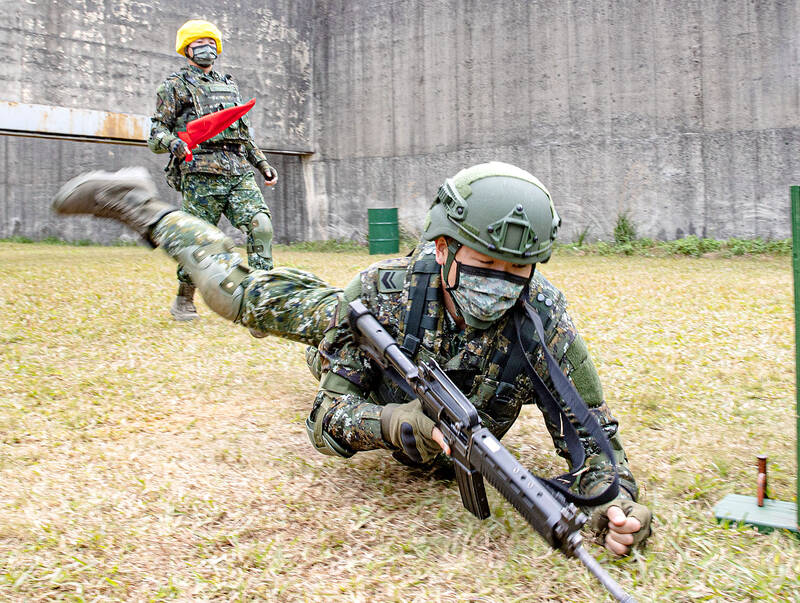The army yesterday showcased its new shooting training program that seeks to simulate battlefield conditions to better prepare soldiers for real combat situations.
In a demonstration open to the media at an army base in Taoyuan, soldiers showed reporters how they fire precisely at targets while standing, prone or kneeling.
Previously, soldiers were only trained to shoot their pistols or rifles in a stationary prone position, the army said.

Photo: CNA
The change was made to simulate battleground conditions, with trainees changing shooting positions as they would need to in combat and fixing their guns if they are jammed, it said.
Trainees are required to run past two obstacles before taking a total of 36 shots from three positions at nine targets that are about 50m to 75m away within 1 minute, 45 seconds, it said.
To pass, soldiers must hit the targets with six of 12 shots while standing, four of 12 while prone and four of 12 while kneeling, the army said.
Army Major Chang Chia-hua (張家華) of the army’s Education, Training and Doctrine Development Command, which devised the new program, said the biggest difference in the new approach was its emphasis on soldiers’ fitness and endurance, and their need to stay still and control their breathing while shooting after being in motion.
The latest change is part of the military’s ongoing training reforms to boost combat readiness as tensions between Taiwan and China remain high.

An essay competition jointly organized by a local writing society and a publisher affiliated with the Chinese Communist Party (CCP) might have contravened the Act Governing Relations Between the People of the Taiwan Area and the Mainland Area (臺灣地區與大陸地區人民關係條例), the Mainland Affairs Council (MAC) said on Thursday. “In this case, the partner organization is clearly an agency under the CCP’s Fujian Provincial Committee,” MAC Deputy Minister and spokesperson Liang Wen-chieh (梁文傑) said at a news briefing in Taipei. “It also involves bringing Taiwanese students to China with all-expenses-paid arrangements to attend award ceremonies and camps,” Liang said. Those two “characteristics” are typically sufficient

A magnitude 5.9 earthquake that struck about 33km off the coast of Hualien City was the "main shock" in a series of quakes in the area, with aftershocks expected over the next three days, the Central Weather Administration (CWA) said yesterday. Prior to the magnitude 5.9 quake shaking most of Taiwan at 6:53pm yesterday, six other earthquakes stronger than a magnitude of 4, starting with a magnitude 5.5 quake at 6:09pm, occurred in the area. CWA Seismological Center Director Wu Chien-fu (吳健富) confirmed that the quakes were all part of the same series and that the magnitude 5.5 temblor was

The brilliant blue waters, thick foliage and bucolic atmosphere on this seemingly idyllic archipelago deep in the Pacific Ocean belie the key role it now plays in a titanic geopolitical struggle. Palau is again on the front line as China, and the US and its allies prepare their forces in an intensifying contest for control over the Asia-Pacific region. The democratic nation of just 17,000 people hosts US-controlled airstrips and soon-to-be-completed radar installations that the US military describes as “critical” to monitoring vast swathes of water and airspace. It is also a key piece of the second island chain, a string of

The Central Weather Administration has issued a heat alert for southeastern Taiwan, warning of temperatures as high as 36°C today, while alerting some coastal areas of strong winds later in the day. Kaohsiung’s Neimen District (內門) and Pingtung County’s Neipu Township (內埔) are under an orange heat alert, which warns of temperatures as high as 36°C for three consecutive days, the CWA said, citing southwest winds. The heat would also extend to Tainan’s Nansi (楠西) and Yujing (玉井) districts, as well as Pingtung’s Gaoshu (高樹), Yanpu (鹽埔) and Majia (瑪家) townships, it said, forecasting highs of up to 36°C in those areas